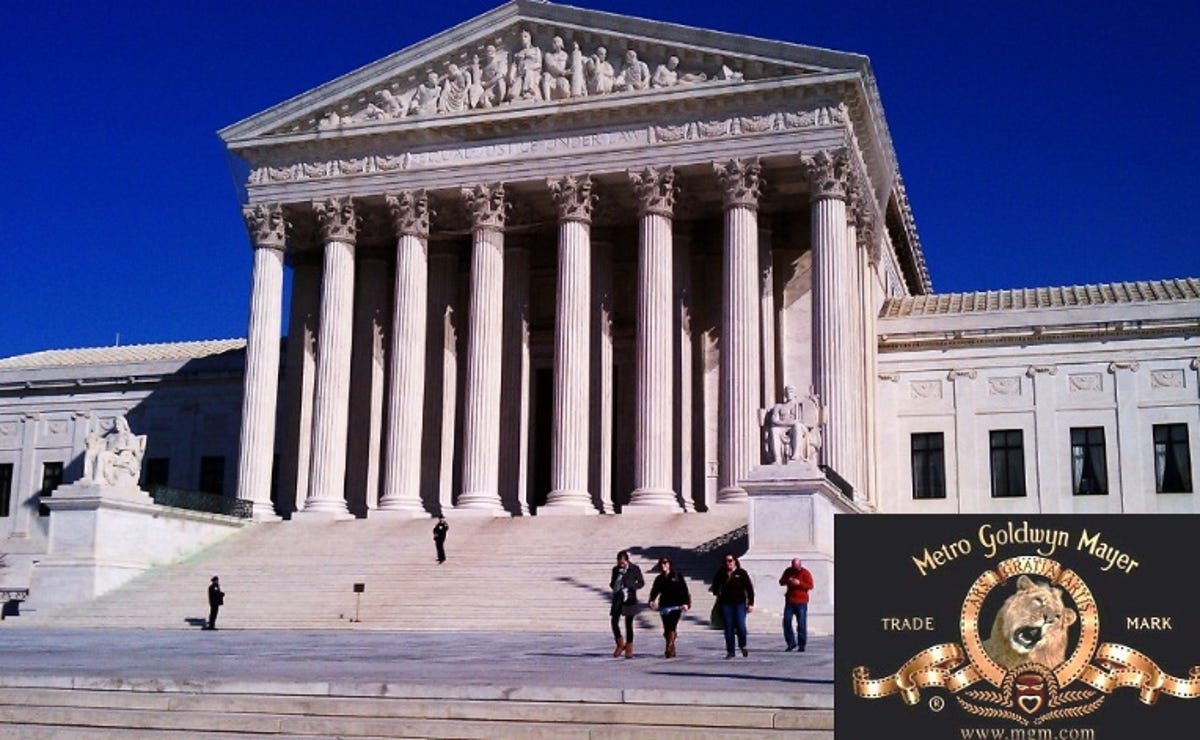Top 10 most influential music sites (photos)
Whether they were victors or flops, each of these 10 services taught important lessons about the power of and problems with digital music.

Grokster
However, a shift to cloud music is just the latest in the evolution of digital tunes. Here, we offer you a ranking of the music sites that have had the greatest influence over the last decade or so.
10) Grokster
Grokster was a peer-to-peer company that gained a following in the early 2000s and will forever be associated with the landmark copyright case known as MGM Studios v. Grokster. The case helped define the limits of online file sharing--some would say unfairly--for movies and songs.
Film studios and record labels filed the lawsuit against Grokster and Streamcast, the firm that created the Morpheus file-sharing client. They accused the companies of inducing copyright infringement. Two lower courts found legitimate purposes for P2P technology and ruled that the services should be protected from liability. But in a unanimous decision in 2005, the U.S. Supreme Court ruled that Grokster and Streamcast "fostered" infringement and were "liable for the resulting acts of infringement by [users]."
That Grokster became synonymous with the case was purely by chance, said former Grokster President Wayne Rosso. Streamcast's Morpheus system was much more popular, but the defendants were listed in alphabetical order.
Rhapsody
People don't want to rent music.
That's always been the knock on subscription music services. But Rhapsody, which was acquired in 2003 by then RealNetworks CEO Rob Glaser (at left), has argued for a decade that if consumers were offered a huge selection of songs, they would gladly pay a small monthly fee for access. Wrong. The public has stayed away in droves.
Now, with cloud-music services from Google, Apple and others expected to adopt this subscription-business model, the market at long last is supposedly ready to catch up to Rhapsody. The Justin Timberlake line "this is our time" should be Rhapsody's tagline.
Still, if subscription is the future, it's hard to tell from Rhapsody's numbers. In January, the company reported 750,000 paying subscribers.
By contrast, Spotify, a European music service launched in 2008 that uses a subscription model, already has 1 million paying subscribers.
SpiralFrog
This one is about a prince turning into a toad.
SpiralFrog became a flag bearer for services that offered songs free of charge while trying to support operations through ad sales. In 2006, The New York Times wrote that the business model was a clever piracy-busting idea. Turned out no self-respecting pirate would go near it. Songs were locked in DRM, and the music library was missing songs from two of the four major record labels. SpiralFrog accumulated more than $40 million in debt by the time the company collapsed in 2009. One frustrated manager wrote: "How do we explain spending $1.5 million in marketing in the month of June when our resulting revenue was $69,711...an oops?"
Talk about customer care: after it closed, SpiralFrog managers enabled former employees to use the customer e-mail list for commercial purposes.
SpiralFrog was a successful harbinger in at least one respect, though. It was among the first ad-supported start-ups to go down in flames. Others have included Imeem and Ruckus.
YouTube
Leave it to the Web's top ad company to produce one of the few bright spots in ad-supported music.
YouTube eclipsed MTV as the premiere music-video hub. The millions of music videos on YouTube, as well as on Vevo--the spinoff the labels created with YouTube's help--have become a music-discovery mecca. As a genre, music videos are the most popular fare on YouTube responsible for hundreds of millions of views. The site also gave us Justin Bieber, for Pete's sake.
As for profits, Google won't disclose, but music industry sources say the four largest record companies are happy with the ad revenue that YouTube produces.
MySpace
At one time, the social network was the digital equivalent of the juke joint.
MySpace was an online gathering place where music quickly became one of the major themes. Up-and-coming acts showcased themselves by offering song samples and interacting with followers.
Before long, MySpace became as well known for the amount of free music it offered as it was for helping people connect online.
Alas, when it came to pure social networking, Facebook stomped MySpace into jelly. Rupert Murdoch's baby is now going the way of The Peppermint Lounge and CBGB, famous offline music venues that for varying reasons faded into music history.
Pandora
Can Pandora chase away traditional radio?
To fans, the Web radio service is the antidote for the endless top-40 loops played by terrestrial radio stations. Listeners choose songs or artists they enjoy and the company's music recommendation engine, which bubbled up out of the Music Genome Project, will choose songs based on their choices.
The company is planning to file for an initial public offering soon and Pandora would seem to be another example of an ad-supported music service that has made good. But we still don't know whether the business model is profitable. While documents filed this year by Pandora with the Securities and Exchange Commission show the company has seen profitable quarters, the company has also reported losses for each of the past three years.

LimeWire
LimeWire's music wasn't free for Mark Gorton.
Gorton (at left, coming out of federal court this month) founded the LimeWire file-sharing service, which has reserved a spot in the pantheon of file sharing for the length of time it managed to operate with a $1.4 billion copyright suit hanging over its head. For much of the past decade, LimeWire was responsible for distributing billions of songs to millions of people without charging them. For a time, LimeWire was responsible for 80 percent of all music illegally downloaded in the United States, according to research firm NPD Group.
Something else Gorton will be remembered for is the price he paid for all this. He was sued in 2006 by the four major labels and earlier this month agreed to settle the case by paying $105 million.
MP3.com
MP3 set music free.
The audio format compresses digital music so fans can easily store thousands of songs on tiny players and transfer them via the Web. Thank the Moving Pictures Experts Group (MPEG) for creating the MP3, but it was MP3.com and founder Michael Robertson (at left), who helped make it popular.
In the late 1990s, companies such as Microsoft, RealNetworks, and even AT&T were working on audio formats protected by DRM, which would limit sharing but also make it hard for people to move their songs between their own different devices. Robertson recognized that the public would never accept this. MP3 is now the de facto download format.
Robertson is also the godfather of cloud music. A decade ago, MP3.com began scanning users' computer hard drives and then offered to stream the same songs to any of their Web-enabled devices. Enabling this kind of ubiquitous access is what Google and Amazon have begun doing recently and what Apple is expected to do soon. Later, MP3.com went public, was sued by the record labels and then sold. A watered-down version ended up at CNET.
"Without Robertson, Napster would have never happened," said Wayne Rosso, former president of Grokster. "People in the music industry would s--- on him all the time, but he was a decade ahead of the curve. He is digital music's Ho Chi Minh."
iTunes
Apple helped free us from the tyranny of bundled music.
Apple sliced music buying into 99-cent chunks and let us buy only the songs we wanted. Gone were $15 discs packed with B-sides and crappy record-store return policies. Our CDs once crammed entire bookcases. But Apple and iTunes, the company's media-management software and store, enabled us to neatly tuck the equivalent number of songs into our pockets and purses.
Steve Jobs (at left), Apple's CEO, stripped down and rebuilt nearly the entire music experience for consumers. His company created a software, hardware, and retail answer for buying, managing, and storing digital songs. Consumers loved the company for that, and Apple has sold more than 10 billion songs. In 2008, the company eclipsed Tower, Virgin, and even Wal-Mart to become the largest music retailer in the land--online or offline.
One after the other, some of the biggest tech and entertainment companies have challenged Apple's dominance over digital music, including Sony, MTV, Microsoft, RealNetworks, Amazon.com, Yahoo and Wal-Mart. Apple crushed them.
In a huge understatement, Jobs predicted in 2003, shortly after the launch of the iTunes store, that Microsoft and others who were gearing up to take him on might have some trouble. "We've created this music store," Jobs told Rolling Stone Magazine, "which I think is nontrivial to copy."
Napster
Fans like to say file sharing can't be stopped and there's no getting the genie back into the bottle. Regardless of whether that's true, there's no question about who yanked the cork.
The original Napster, founded by Shawn Fanning (at left), demonstrated the vast power that the Internet gave to everyday people. With the Internet, they could distribute digital content to the masses worldwide. Napster also offered a glimpse into how hard it would be to control that power. The music industry has been in a state of decline ever since Napster emerged in 1999 and will unlikely be the same ever again.
Napster operated with a centralized system but the company would set the stage for decentralized peer-to-peer services. Fanning can be described as the father of BitTorrent, The Pirate Bay, LimeWire, TorrentSpy, Isohunt, and oodles of other file-sharing services. One can argue that without Napster, the digital music revolution may have taken a much longer time to kick in.
Napster wasn't around for very long. The record labels sued for copyright infringement. In 2001, a federal court found Napster liable and ordered the company to stop enabling the sharing of copyrighted songs. In 2002, the company filed for bankruptcy. Its assets, including the company name, were sold off.
Its legacy lives on.

